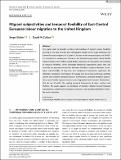Files in this item
Migrant subjectivities and temporal flexibility of East-Central European labour migration to the United Kingdom
Item metadata
| dc.contributor.author | Shubin, Sergei | |
| dc.contributor.author | McCollum, David | |
| dc.date.accessioned | 2021-08-23T15:30:01Z | |
| dc.date.available | 2021-08-23T15:30:01Z | |
| dc.date.issued | 2021-08-18 | |
| dc.identifier | 275055685 | |
| dc.identifier | 84866173-0e30-4e02-8e37-bd1216644457 | |
| dc.identifier | 000686375700001 | |
| dc.identifier | 85112690689 | |
| dc.identifier.citation | Shubin , S & McCollum , D 2021 , ' Migrant subjectivities and temporal flexibility of East-Central European labour migration to the United Kingdom ' , Population, Space and Place , vol. Early View , e2508 . https://doi.org/10.1002/psp.2508 | en |
| dc.identifier.issn | 1544-8444 | |
| dc.identifier.other | RIS: urn:9DE24D16A44827B1961319C05285081A | |
| dc.identifier.other | RIS: urn:9DE24D16A44827B1961319C05285081A | |
| dc.identifier.other | ORCID: /0000-0001-8716-6852/work/99466241 | |
| dc.identifier.uri | https://hdl.handle.net/10023/23817 | |
| dc.description | Funding: Economic and Social Research Council, Grant/Award Numbers: ES/J007374/1, RES-625-28-0001. | en |
| dc.description.abstract | This paper seeks to broaden existing understandings of migrant worker flexibility drawing on the data from the two ethnographic studies of low-wage employers and Eastern European migrants in Scotland. It focuses on the temporal aspects of flexibility production in employment discourse and temporal expectations about flexible migrant workers. Our findings reveal double movement of interruption and remaking of temporal flexibility, which challenges directional expectations about time and unsettles the assumed connectivity between flexibility's temporal elements. Uncertainty and instability of migration and employment frameworks undermine the attempts of employers and migrants to manage time, to develop continuous portfolio careers and coherent temporal horizons. Furthermore, contested temporal expectations about flexible migrant workers create fragmented and fractured "flexiworkers" that do not fit within the existing temporal frameworks of signs, routines, and rhythms. The paper suggests re-orientation of flexibility debates beyond temporal measurement, outside familiar temporal structures, and towards redefinition of flexible worker identities. | |
| dc.format.extent | 11 | |
| dc.format.extent | 766310 | |
| dc.language.iso | eng | |
| dc.relation.ispartof | Population, Space and Place | en |
| dc.subject | Eastern Europe | en |
| dc.subject | Flexibility | en |
| dc.subject | Labour migration | en |
| dc.subject | Low-waged migrants | en |
| dc.subject | Migrant worker | en |
| dc.subject | Time | en |
| dc.subject | UK | en |
| dc.subject | JV Colonies and colonization. Emigration and immigration. International migration | en |
| dc.subject | 3rd-DAS | en |
| dc.subject | SDG 10 - Reduced Inequalities | en |
| dc.subject.lcc | JV | en |
| dc.title | Migrant subjectivities and temporal flexibility of East-Central European labour migration to the United Kingdom | en |
| dc.type | Journal article | en |
| dc.contributor.sponsor | Economic & Social Research Council | en |
| dc.contributor.institution | University of St Andrews. School of Geography & Sustainable Development | en |
| dc.contributor.institution | University of St Andrews. Population and Health Research | en |
| dc.identifier.doi | https://doi.org/10.1002/psp.2508 | |
| dc.description.status | Peer reviewed | en |
| dc.identifier.grantnumber | RES-625-28-001 | en |
This item appears in the following Collection(s)
Items in the St Andrews Research Repository are protected by copyright, with all rights reserved, unless otherwise indicated.

